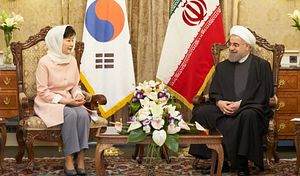The Middle East played an important role in South Korea’s early economic development, and may again be key to boosting growth amidst its current slowdown. South Korean President Park Geun-hye identified the Middle East as a possible “answer to our prayer for economic revitalization” in March 2015 and traveled to the region earlier this year in May. Shortly after Park’s visit to the Middle East, several South Korean companies won lucrative contracts in the region, such as Doosan Heavy Industries and Construction’s $187 million deal to build a desalination plant in Iran. Officials from South Korea and Saudi Arabia also discussed ways to expand economic cooperation, with particular focus on bilateral trade and Korea’s involvement in the Saudi Arabian 2030 Vision initiative. Though it might be tempting to declare this the start of the long awaited “Second Middle East boom,” the political and economic situation in the region is much more complex than it was during the first boom in the 1970s and 1980s, requiring South Korea to implement a thoughtful strategy to make the most of huge business opportunities in the Middle East.
Alongside the economic potential of the region, Korea must be cognizant of the challenges and hazards which could threaten its investments. In order to properly manage risks, Seoul should divide its approach toward Middle Eastern countries into three distinct groups: the relatively stabilized countries, post-Arab Spring countries that are still at risk of destabilization, and destabilized countries.
The relatively stabilized countries in the Middle East consist of Saudi Arabia, Kuwait, Qatar, Oman, United Arab Emirates, Oman, Iran, and Israel. Within this group, the dominant players possessing the strongest influence on regional security, economics, and politics are Saudi Arabia, Iran, and Israel. At the core of South Korea’s relationship with these countries is trade, particularly in the energy sector. However, trade volume is influenced by regional stability; in other words, tensions between Iran and Saudi Arabia on the one hand and conflicts in Syria and Yemen on the other. Seoul’s Middle East policy needs to take into account not just its economic interest in these states but also the regional interactions between the different states. For example, Seoul should pay attention how the conflicts in Syria and Yemen will influence the tensions between Iran and Saudi Arabia.
President Park Geun-hye’s visit to Iran in May with representatives from 236 South Korean companies sends a clear message to Iran and to competitors that South Korea is seeking to expand business ties after the P5+1 agreement. Yet, it is not the only state that is open for business in the Post P5+1 era. Tehran is looking for economic projects that will allow it to develop its economy, which suffered from severe sanctions in the last few years. As Tehran strives to show Iranian citizens how the P5+1 agreement can result in massive economic benefits, South Korea can expand its trade with Iran by offering new business opportunities for the Iranian market.
For Saudi Arabia, lower oil prices have forced Riyadh to look for other sources of income. The new Saudi Arabia 2030 Vision launched by Mohammed bin Salman also opens a new window for economic cooperation between South Korean companies and the rising Saudi private sector, especially in regard to new energy projects as well as in emerging automotive and health industries.
In the case of Israel, Seoul should continue to pursue an FTA with Israel to greatly facilitate technological cooperation, yet with attention to the potential impact on its possible future involvement in promoting confidence-building projects between Israel and the Palestinian Authority.
Some post-Arab Spring Countries are continuing to overcome economic and political instability in the wake of the spring 2011 political movements, including Egypt and Libya. Although trade with and investments in some of these countries carry economic, political, and even security risks, South Korea, as a middle power that is not seen as a threatening force, could play a more dynamic role by supporting these states while furthering its economic and security interests.
South Korea should recognize its potential as a middle power state to prevent an escalating crisis. Korean investment in Egypt could assist economic stabilization and the subsequent resumption of democracy. Though Korea cannot be expected to replace China, the United States, or Europe, Seoul can exploit its non-superpower image to assist the Egyptian economy without raising fears that it is looking to take control. In Jordan, Seoul could help to prevent a crisis that might destabilize the country and spread to regional neighbors by, for example, increasing official development assistance to provide humanitarian assistance for Syrian refugees.
The destabilized states in the Middle East could pose a threat to South Korea’s interests in the region if it becomes militarily involved in these conflicts. Seoul would thus be advised to continue with its neutral policy toward these conflicts. Once the wars in these states end and leaders look to rebuild their countries, South Korea can be there to offer both experience and financial assistance to fund the construction of new infrastructure.
In order to maximize the potential of the Middle East to boost the South Korean economy, Seoul needs a comprehensive policy toward the region incorporating economic, political, and geopolitical factors. The Korean government should, therefore, consult with South Korean companies about the political and security dynamics of the Middle East. The risks of doing business must be taken into account, but if maneuvered adeptly, should not prevent South Korea from boosting its gains in the region. A well thought-out approach could create mutually beneficial relationships and help Seoul reap the full benefits of a “Second Middle East boom.”
Alon Levkowitz is a Lecturer and the Coordinator of the Asian Studies Program at Bar-llan University.
This piece is adapted from a longer essay published in the Korea Economic Institute of America’s Academic Paper Series. The full-length essay can be viewed here.
































